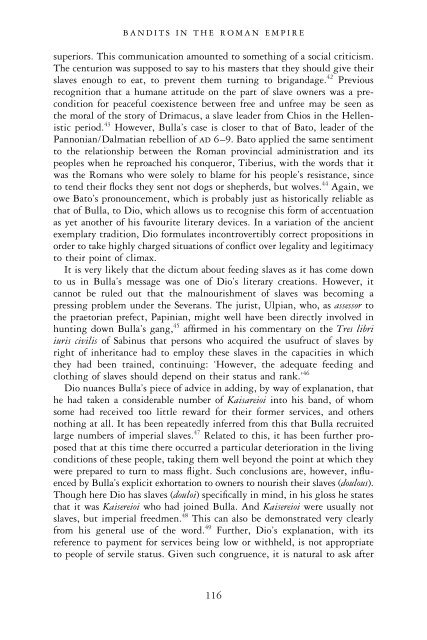Create successful ePaper yourself
Turn your PDF publications into a flip-book with our unique Google optimized e-Paper software.
BANDITS IN THE ROMAN EMPIRE<br />
superiors. This communication amounted to something of a social criticism.<br />
The centurion was supposed to say to his masters that they should give their<br />
slaves enough to eat, to prevent them turning to brigandage. 42 Previous<br />
recognition that a humane attitude on the part of slave owners was a precondition<br />
for peaceful coexistence between free and unfree may be seen as<br />
the moral of the story of Drimacus, a slave leader from Chios in the Hellenistic<br />
period. 43 However, Bulla’s case is closer to that of Bato, leader of the<br />
Pannonian/Dalmatian rebellion of ad 6–9. Bato applied the same sentiment<br />
to the relationship between the Roman provincial administration and its<br />
peoples when he reproached his conqueror, Tiberius, with the words that it<br />
was the Romans who were solely to blame for his people’s resistance, since<br />
to tend their flocks they sent not dogs or shepherds, but wolves. 44 Again, we<br />
owe Bato’s pronouncement, which is probably just as historically reliable as<br />
that of Bulla, to Dio, which allows us to recognise this form of accentuation<br />
as yet another of his favourite literary devices. In a variation of the ancient<br />
exemplary tradition, Dio formulates incontrovertibly correct propositions in<br />
order to take highly charged situations of conflict over legality and legitimacy<br />
to their point of climax.<br />
It is very likely that the dictum about feeding slaves as it has come down<br />
to us in Bulla’s message was one of Dio’s literary creations. However, it<br />
cannot be ruled out that the malnourishment of slaves was becoming a<br />
pressing problem under the Severans. The jurist, Ulpian, who, as assessor to<br />
the praetorian prefect, Papinian, might well have been directly involved in<br />
hunting down Bulla’s gang, 45 affirmed in his commentary on the Tres libri<br />
iuris civilis of Sabinus that persons who acquired the usufruct of slaves by<br />
right of inheritance had to employ these slaves in the capacities in which<br />
they had been trained, continuing: ‘However, the adequate feeding and<br />
clothing of slaves should depend on their status and rank.’ 46<br />
Dio nuances Bulla’s piece of advice in adding, by way of explanation, that<br />
he had taken a considerable number of Kaisareioi into his band, of whom<br />
some had received too little reward for their former services, and others<br />
nothing at all. It has been repeatedly inferred from this that Bulla recruited<br />
large numbers of imperial slaves. 47 Related to this, it has been further proposed<br />
that at this time there occurred a particular deterioration in the living<br />
conditions of these people, taking them well beyond the point at which they<br />
were prepared to turn to mass flight. Such conclusions are, however, influenced<br />
by Bulla’s explicit exhortation to owners to nourish their slaves (doulous).<br />
Though here Dio has slaves (douloi) specifically in mind, in his gloss he states<br />
that it was Kaisereioi who had joined Bulla. And Kaisereioi were usually not<br />
slaves, but imperial freedmen. 48 This can also be demonstrated very clearly<br />
from his general use of the word. 49 Further, Dio’s explanation, with its<br />
reference to payment for services being low or withheld, is not appropriate<br />
to people of servile status. Given such congruence, it is natural to ask after<br />
116


